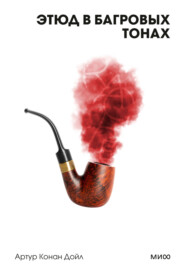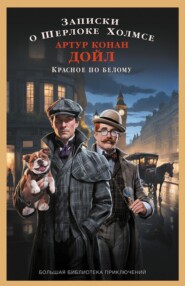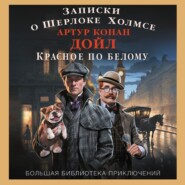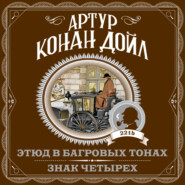По всем вопросам обращайтесь на: info@litportal.ru
(©) 2003-2025.
✖
The White Company / Белый отряд. Книга для чтения на английском языке
Настройки чтения
Размер шрифта
Высота строк
Поля
“I should not be surprised to learn, mon camarade,” said the soldier, as he heaped a slice of the fish upon Alleyne’s tranchoir of bread, “that you could read written things, since you are so ready with your brushes and pigments.”
“It would be shame to the good brothers of Beaulieu if I could not,” he answered, “seeing that I have been their clerk this ten years back.”
The bowman looked at him with great respect. “Think of that!” said he. “And you with not a hair to your face, and a skin like a girl. I can shoot three hundred and fifty paces with my little popper there, and four hundred and twenty with the great war-bow; yet I can make nothing of this, nor read my own name if you were to set ‘Sam Aylward’ up against me. In the whole Company there was only one man who could read, and he fell down a well at the taking of Ventadour, which proves that the thing is not suited to a soldier, though most needful to a clerk.”
“I can make some show at it,” said big John; “though I was scarce long enough among the monks to catch the whole trick of it.”
“Here, then, is something to try upon,” quoth the archer, pulling a square of parchment from the inside of his tunic. It was tied securely with a broad band of purple silk, and firmly sealed at either end with a large red seal. John pored long and earnestly over the inscription upon the back, with his brows bent as one who bears up against great mental strain.
“Not having read much of late,” he said, “I am loth to say too much about what this may be. Some might say one thing and some another, just as one bowman loves the yew, and a second will not shoot save with the ash. To me, by the length and the look of it, I should judge this to be a verse from one of the Psalms.”
The bowman shook his head. “It is scarce likely,” he said, “that Sir Claude Latour should send me all the way across seas with naught more weighty than a psalm-verse. You have clean overshot the butts this time, mon camarade. Give it to the little one. I will wager my feather-bed that he makes more sense of it.”
“Why, it is written in the French tongue,” said Alleyne, “and in a right clerkly hand. This is how it runs: ‘À le moult puissant et moult honorable chevalier, Sir Nigel Loring de Christchurch, de sont très fidèle amis Sir Claude Latour, capitaine de la Compagnie blanche, châtelain de Biscar, grand seigneur de Montchâteau, vavaseur de le renommé Gaston, Comte de Foix, tenant les droits de la haute justice, de la milieu, et de la basse.’
Which signifies in our speech: ‘To the very powerful and very honourable knight, Sir Nigel Loring of Christchurch, from his very faithful friend Sir Claude Latour, captain of the White Company, chatelain of Biscar, grand lord of Montchâteau, and vassal to the renowned Gaston, Count of Foix, who holds the rights of the high justice the middle and the low.’”
“Look at that now!” cried the bowman in triumph. “That is just what he would have said.”
“I can see now that it is even so,” said John, examining the parchment again. “Though I scarce understand this high, middle, and low.”
“By my hilt! you would understand it if you were Jacques Bonhomme[74 - Jacques Bonhomme – Жак-простак, прозвище крестьянина, участника Жакерии (XIV в.)]. The low justice means that you may fleece him, and the middle that you may torture him, and the high that you may slay him. That is about the truth of it. But this is the letter which I am to take; and since the platter is clean it is time that we trussed up and were afoot.
You come with me, mon gros[75 - mon gros – (фр.) мой большой] Jean; and as to you, little one, where did you say that you journeyed?”
“To Minstead.”
“Ah, yes, I know this forest-country well, though I was born myself in the Hundred of Easebourne, in the Rape of Chichester, hard by the village of Midhurst. Yet I have not a word to say against the Hampton men, for there are no better comrades or truer archers in the whole Company than some who learned to loose the string[76 - learned to loose the string – (уст.) учились стрелять из лука] in these very parts. We shall travel round with you to Minstead, lad, seeing that it is little out of our way.”
“I am ready,” said Alleyne, right pleased at the thought of such company upon the road.
“So am not I. I must store my plunder at this inn, since the hostess is an honest woman. Holà, ma chérie, I wish to leave with you my gold-work, my velvet, my silk, my feather-bed, my incense-boat, my ewer, my naping linen, and all the rest of it. I take only the money in a linen bag, and the box of rose-coloured sugar, which is a gift from my Captain to the Lady Loring. Wilt guard my treasure for me?”
“It shall be put in the safest loft, good archer. Come when you may, you shall find it ready for you.”
“Now, there is a true friend!” cried the bowman, taking her hand. “There is a bonne amie[77 - bonne amie – (фр.) хороший друг]! English land and English women, say I, and French wine and French plunder. I shall be back anon, mon ange. I am a lonely man, my sweeting, and I must settle some day when the wars are over and done. Mayhap you and I – — Ah, méchante, méchante![78 - Ah, méchante, méchante! – (фр.) Ах, злая, злая!] There is la petite peeping from behind the door. Now, John, the sun is over the trees; you must be brisker than this when the bugleman blows ‘Bows and Bills.’”
“I have been waiting this time back,” said Hordle John gruffly.
“Then we must off. Adieu, ma vie![79 - Adieu, ma vie! – (фр.) Прощай, жизнь моя!] The two livres shall settle the score and buy some ribbons against the next kermesse[80 - kermesse – (фр.) ярмарка, гулянье]. Do not forget Sam Aylward, for his heart shall ever be thine alone – and thine, ma petite! So, marchons[81 - marchons – (фр.) пошли], and may St. Julian grant us as good quarters elsewhere!”
The sun had risen over Ashurst and Denny woods, and was shining brightly, though the eastern wind had a sharp flavour to it, and the leaves were flickering thickly from the trees. In the High Street of Lyndhurst the wayfarers had to pick their way, for the little town was crowded with the guardsmen, grooms, and yeomen-prickers who were attached to the king’s hunt. The king himself was staying at Castle Malwood, but several of his suite had been compelled to seek such quarters as they might find in the wooden or wattle-and-daub cottages of the village. Here and there a small escutcheon, peeping from a glassless window, marked the night’s lodging of knight or baron. These coats-of-arms could be read, where a scroll would be meaningless, and the bowman, like most men of his age, was well versed in the common symbols of heraldry.
“There is the Saracen’s head of Sir Bernard Brocas,” quoth he. “I saw him last at the ruffle at Poictiers some ten years back, when he bore himself like a man. He is the master of the king’s horse, and can sing a right jovial stave, though in that he cannot come nigh to Sir John Chandos, who is the first at the board or in the saddle. Three martlets on a field azure. That must be one of the Luttrells. By the crescent upon it, it should be the second son of old Sir Hugh, who had a bolt through his ankle at the intaking of Romorantin, he having rushed into the fray ere his squire had time to clasp his solleret to his greave. There too is the hackle which is the old device of the De Brays. I have served under Sir Thomas de Bray, who was as jolly as a pie, and a lusty swordsman until he got too fat for his harness.”
So the archer gossiped as the three wayfarers threaded their way among the stamping horses, the busy grooms, and the knots of pages and squires who disputed over the merits of their masters’ horses and deerhounds. As they passed the old church, which stood upon a mound at the left-hand side of the village street, the door was flung open, and a stream of worshippers wound down the sloping path, coming from the morning mass, all chattering like a cloud of jays. Alleyne bent knee and doffed hat at the sight of the open door; but ere he had finished an Ave, his comrades were out of sight round the curve of the path, and he had to run to overtake them.
“What!” he said, “not one word of prayer before God’s own open house? How can ye hope for His blessing upon the day?”
“My friend,” said Hordle John, “I have prayed so much during the last two months, not only during the day, but at Matins, Lauds, and the like, when I could scarce keep my head upon my shoulders for nodding, that I feel that I have somewhat overprayed myself.”
“How can a man have too much religion?” cried Alleyne earnestly. “It is the one thing that availeth. A man is but a beast as he lives from day to day, eating and drinking, breathing and sleeping. It is only when he raises himself, and concerns himself with the immortal spirit within him, that he becomes in very truth a man. Bethink ye how sad a thing it would be that the blood of the Redeemer should be spilled to no purpose.”
“Bless the lad, if he doth not blush like any girl, and yet preach like the whole College of Cardinals,” cried the archer.
“In truth I blush that anyone so weak and so unworthy as I should try to teach another that which he finds it so passing hard to follow himself.”
“Prettily said, mon garçon. Touching that same slaying of the Redeemer, it was a bad business. A good padre in France read to us from a scroll the whole truth of the matter. The soldiers came upon Him in the garden. In truth, these Apostles of His may have been holy men, but they were of no great account as men-at-arms. There was one, indeed, Sir Peter, who smote out like a true man; but, unless he is belied, he did but clip a varlet’s ear, which was no very knightly deed. By these ten finger-bones! had I been there, with Black Simon of Norwich, and but one score picked men of the Company, we had held them in play. Could we do no more, we had at least filled the false knight, Sir Judas, so full of English arrows that he would curse the day that ever he came on such an errand.”
The young clerk smiled at his companion’s earnestness.
“Had He wished help,” he said, “He could have summoned legions of archangels from heaven, so what need had He of your poor bow and arrow? Besides, bethink you of His own words – that those who live by the sword shall perish by the sword.”
“And how could man die better?” asked the archer. “If I had my wish, it would be to fall so – not, mark you, in any mere skirmish of the Company, but in a stricken field, with the great lion banner waving over us and the red oriflamme[82 - oriflamme – (фр. уст.) знамя] in front, amid the shouting of my fellows and the twanging of the strings. But let it be sword, lance, or bolt that strikes me down: for I should think it shame to die from an iron ball from fire-crake or bombard or any such unsoldierly weapon, which is only fitted to scare babes with its foolish noise and smoke.”
“I have heard much even in the quiet cloisters of these new and dreadful engines,” quoth Alleyne. “It is said, though I can scarce bring myself to believe it, that they will send a ball twice as far as a bowman can shoot his shaft, and with such force as to break through armour of proof.”
“True enough, my lad. But while the armourer is thrusting in his devil’s dust, and dropping his ball, and fighting his flambeau, I can very easily loose six shafts, or eight maybe, so he hath no great vantage after all. Yet I will not deny that at the intaking of a town it is well to have good store of bombards. I am told that at Calais they made dints in the wall that a man might put his head into. But surely, comrades, someone who is grievously hurt hath passed along this road before us.”
All along the woodland track there did indeed run a scattered straggling trail of blood-marks, sometimes in single drops, and in other places in broad ruddy gouts, smudged over the dead leaves or crimsoning the white flint-stones.
“It must be a stricken deer,” said John.
“Nay, I am woodman enough to see that no deer hath passed this way this morning; and yet the blood is fresh. But hark to the sound!”
They stood listening all three with sidelong heads. Through the silence of the great forest there came a swishing, whistling sound, mingled with the most dolorous groans, and the voice of a man raised in a high quavering kind of song. The comrades hurried onwards eagerly, and topping the brow of a small rising they saw upon the other side the source from which these strange noises arose.
A tall man, much stooped in the shoulders, was walking slowly with bended head and clasped hands in the centre of the path. He was dressed from head to foot in a long white linen cloth, and a high white cap with a red cross printed upon it. His gown was turned back from his shoulders, and the flesh there was a sight to make a man wince, for it was all beaten to a pulp, and the blood was soaking into his gown and trickling down upon the ground. Behind him walked a smaller man, with his hair touched with grey, who was clad in the same white garb. He intoned a long whining rhyme in the French tongue, and at the end of every line he raised a thick cord, all jagged with pellets of lead, and smote his companion across the shoulders until the blood spurted again. Even as the three wayfarers stared, however, there was a sudden change, for the smaller man, having finished his song, loosened his own gown and handed the scourge to the other, who took up the stave once more and lashed his companion with all the strength of his bare and sinewy arm. So, alternately beating and beaten, they made their dolorous way through the beautiful woods and under the amber arches of the fading beech-trees, where the calm strength and majesty of Nature might serve to rebuke the foolish energies and misspent strivings of mankind.
Such a spectacle was new to Hordle John and to Alleyne Edricson; but the archer treated it lightly, as a common matter enough.
“These are the Beating Friars, otherwise called the Flagellants,” quoth he. “I marvel that ye should have come upon none of them before, for across the water they are as common as gallybaggers. I have heard that there are no English among them, but that they are from France, Italy, and Bohemia. En avant, camarades! that we may have speech with them.”
As they came up to them, Alleyne could hear the doleful dirge which the beater was chanting, bringing down his heavy whip at the end of each line, while the groans of the sufferer formed a sort of dismal chorus. It was in old French, and ran somewhat in this way:
Or avant, entre nous tous frères
Battons nos charognes bien fort
En remembrant la grant misère
De Dieu et sa piteuse mort,
Qui fut pris en la gent amère
Et vendus et trais à tort
Et bastu sa chair, vierge et dère
Au nom de oe battons plus fort.[83 - Вперед, за благодать Святую —Все как один. Настал черед,Ударим дружно, памятуя о смерти,Господа. Вперед!Господь наш схвачен был врагами,Он злые муки претерпелИ принял смерть…Победа с нами!Вперед, кто доблестен и смел!(пер. с франц.)]
Then at the end of the verse the scourge changed hands and the chanting began anew.
“Truly, holy fathers,” said the archer in French as they came abreast of them, “you have beaten enough for today. The road is all spotted like a shambles at Martinmas[84 - Martinmas – день святого Мартина, 11 ноября]. Why should ye mishandle yourselves thus?”

















